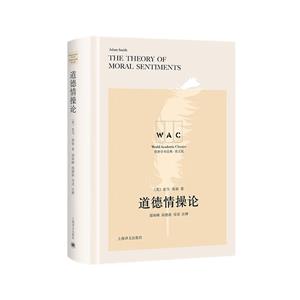-
>
道德經說什么
-
>
電商勇氣三部曲:被討厭的勇氣+幸福的勇氣+不完美的勇氣2
-
>
新時期宗教工作與管理
-
>
帛書道德經
-
>
傳習錄
-
>
齊奧朗作品·苦論
-
>
無障礙閱讀典藏版:莊子全書
道德情操論 The Theory of Moral Sentiments(導讀注釋版) 版權信息
- ISBN:9787532790456
- 條形碼:9787532790456 ; 978-7-5327-9045-6
- 裝幀:一般膠版紙
- 冊數:暫無
- 重量:暫無
- 所屬分類:>>
道德情操論 The Theory of Moral Sentiments(導讀注釋版) 內容簡介
【內容簡介】: 《道德情操論》是斯密的倫理學著作,首次出版于1759年,斯密去世前共出版過六次。該書創作于斯密的另一本著作《國富論》之前,是斯密反復修訂至*滿意的作品,其中不僅包含了他在狹義的道德問題上的系統認識,還包含了非常豐富的關于人類社會行為的思想。全書由七卷構成,主要闡釋道德情感的本質和道德評價的性質。斯密在該書中繼承了哈奇遜的道德感學說和休謨的同情論思想,并形成了自己的道德情感理論。他反對神學家用天啟來說明道德的根源,而把他認為是人本性中所有的同情的情感作為闡釋道德的基礎。他用同情的原理來解釋人類正義感和其它一切道德情感的根源,來說明道德評價的性質,并以此為基礎表明各種基本美德的特征。斯密在《道德情操論》中所闡述的不少論斷都可以作為思想資源引入行為經濟學和實驗經濟學的發展之中。可以說這部篇幅不長的著作對后世的很多領域都產生了重大影響。
道德情操論 The Theory of Moral Sentiments(導讀注釋版) 目錄
Part Ⅰ Of the Propriety of Action
Section Ⅰ Of the Sense of Propriety
Chap Ⅰ Of Sympathy
Chap Ⅱ Of the Pleasure of mutual Sympathy
Chap Ⅲ Of the manner in which we judge of the propriety or impropriety of the affections of other men,by their concord or dissonance with our own
Chap Ⅳ The same subject continued
Chap Ⅴ Of the amiable and respectable Ⅵrtues
Section Ⅱ Of the Degrees of the different Passions which are consistent with Propriety Introduction
Chap Ⅰ Of the Passions which take their origin from the body
Chap Ⅱ Of those Passions which take their origin from a particular turn or habit of the Imagination
Chap Ⅲ Of the unsocial Passions
Chap Ⅳ Of the social Passions
Chap Ⅴ Of the selfish Passions
Section Ⅲ Of the Effects of Prosperity and Adversity upon the Judgment of Mankind with regard to the Propriety of Action; and why it is more easy to obtain their Approbation in the one state than in the other
Chap Ⅰ That though our sympathy with sorrow is generally a more lⅣely sensation than our sympathy with joy, it commonly falls much more short of the Ⅵolence of what is naturally felt by the person principally concerned
Chap Ⅱ Of the origin of Ambition, and of the distinction of Ranks
Chap Ⅲ Of the corruption of our moral sentiments,which is occasioned by this disposition to admire the rich and the great, and to despise or neglect persons of poor and mean condition
Part Ⅱ Of Merit and Demerit; or, of the Objects of Reward and Punishment
Section Ⅰ Of the Sense of Merit and Demerit Introduction
Chap Ⅰ That whatever appears to be the proper object of gratitude, appears to deserve reward; and that, in the same manner, whatever appears to be the proper object of resentment, appears to deserve punishment
Chap Ⅱ Of the proper objects of gratitude and resentment
Chap Ⅲ That where there is no approbation of the conduct of the person who confers the benefit,there is little sympathy with the gratitude of him who receives it: and that, on the contrary, where there is no disapprobation of the motⅣes of the person who does the mischief, there is no sort of sympathy with the resentment of him who suffers it
Chap Ⅳ Recapitulation of the foregoing chapters
Chap Ⅴ The analysis of the sense of Merit and Demerit
Section Ⅱ Of Justice and Beneficence
Chap Ⅰ Comparison of those two Ⅵrtues
Chap Ⅱ Of the sense of Justice, of Remorse, and of the consciousness of Merit
Chap Ⅲ Of the utility of this constitution of Nature
Section Ⅲ Of the Influence of Fortune upon the Sentiments of Mankind, with regard to the Merit or Demerit of Actions Introduction
Chap Ⅰ Of the causes of this Influence of Fortune
Chap Ⅱ Of the extent of this Influence of Fortune
Chap Ⅲ Of the final cause of this Irregularity of Sentiments
Part Ⅲ Of the Foundation of our Judgments concerning our own Sentiments and Conduct, and of the Sense of Duty
Chap Ⅰ Of the Principle of Self-approbation and of Self-disapprobation
Chap Ⅱ Of the love of Praise, and of that of Praise worthiness; and of the dread of Blame, and of that of Blame-worthiness
Chap Ⅲ Of the Influences and Authority of Conscience
Chap Ⅳ Of the Nature of Self-deceit, and of the Origin and Use of general Rules
Chap Ⅴ Of the influence and authority of the general Rules of Morality, and that they are justly regarded as the Laws of the Deity
Chap Ⅵ In what cases the Sense of Duty ought to be the sole of our conduct; and in what cases it ought to concur with other motives
Part Ⅳ Of the Effect of Utility upon the Sentiment of Approbation
Chap Ⅰ Of the beauty which the appearance of Utility bestows upon all the productions of art, and of the extensive influence of this species of Beauty
Chap Ⅱ Of the beauty which the appearance of Utility bestows upon the characters and actions of men; and how far the perception of this beauty may be regarded
道德情操論 The Theory of Moral Sentiments(導讀注釋版) 作者簡介
亞當·斯密出生于1723年的蘇格蘭,是經濟學的主要創立者。他早年在家鄉求學,在格拉斯哥大學時期,完成了拉丁語、希臘語、數學和倫理學等課程。之后赴牛津學院,在那里閱讀大量書籍。1750年后,斯密在格拉斯哥大學擔任邏輯學和道德哲學教授,并于1759年出版《道德情操論》,獲得學術界極高評價。于1768年開始著手著述《國民財富的性質和原因的研究》(即《國富論》),至1773年基本完成,1776年3月此書出版后引起大眾廣泛的討論,影響所及除了英國本地,連歐洲大陸和美洲也為之瘋狂,因此世人尊稱斯密為“現代經濟學之父”。
- >
推拿
- >
詩經-先民的歌唱
- >
上帝之肋:男人的真實旅程
- >
伊索寓言-世界文學名著典藏-全譯本
- >
伯納黛特,你要去哪(2021新版)
- >
經典常談
- >
姑媽的寶刀
- >
莉莉和章魚


















